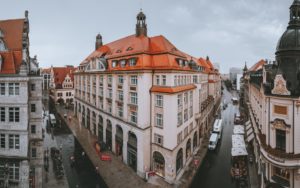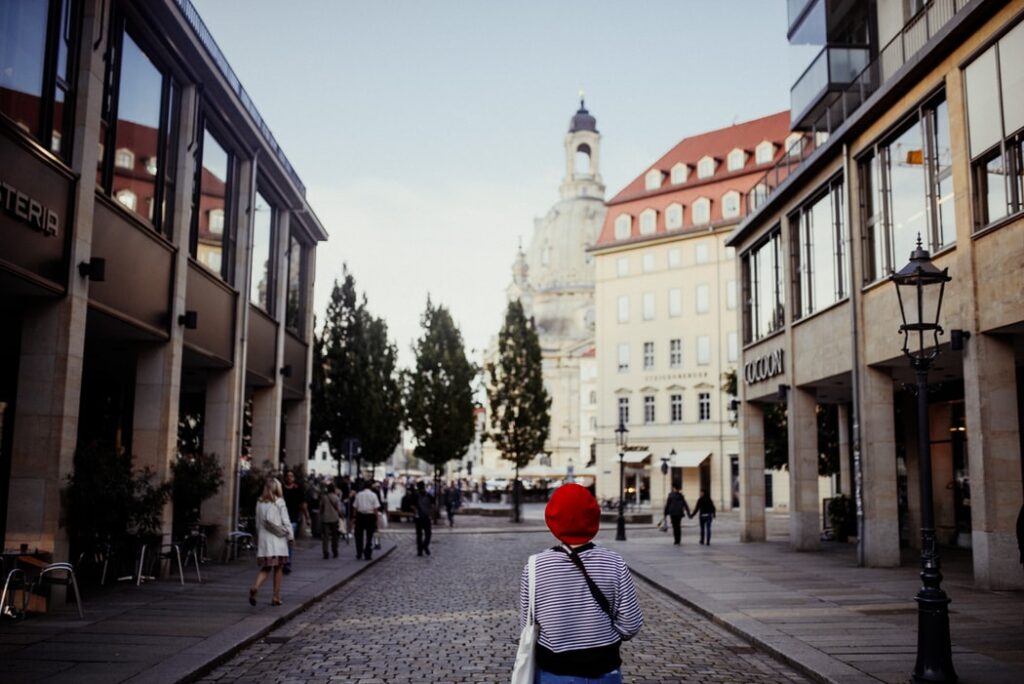In December, we released the top-6 of the best locations in Germany for IT specialists that included the largest cities in the country. This time, we go beyond major German metropolises and tell you about the tech landscape of smaller but not less important cities in terms of IT sector development. This article will complete your vision of Germany’s innovation geography and help to choose the right city for relocation!
Leipzig
Population: 600,000

Leipzig has been a trade city throughout centuries and now offers multiple opportunities for tech people from all over the world looking for new business locations. The city boasts a developed entrepreneurial ecosystem and benefits from close ties with Berlin, the largest tech hub of the country.
- Leipzig is an ideal place for those who are going to set up own technological startup. The city is not so big but really populated which makes the city’s network very interconnected. Leipzig currently hosts about 200 startups. One more plus is that to attract investments for own business is easier in Leipzig than in any other German city, as it provides various public and private funding schemes. For example, according to StartUs Magazine, there are public investment options through the State Development of Saxony including public investment grants of up to 30% for small companies;
- The city of IT talents. Leipzig is a constant supplier of IT talents not only for the city itself but for the whole country. The oldest German management school – HHL Leipzig Graduate School of Management – spawned 80% of all German unicorns. It is recognized as one of the top-ranked MBA schools in the world. Moreover, UK Lancaster University has its own campus in the city.
Dresden
Population: 544,000

Dresden is the capital of Saxony, which is usually referred to as the center of the region’s largest tech network “Silicon Saxony” with nearly 2,000 high-tech companies in the Dresden area alone.
- Since its foundation in 2000, Silicon Saxony has been a self-financed association linking manufacturers, suppliers, universities, research institutes and startups of Saxony. The main goal of the initiative is to foster the development of software technologies and microelectronics with the focus on artificial intelligence, robotics, automation, internet of things, and energy efficiency;
- Dresden along with Leipzig is a hub for Internet of Things technologies within Germany’s Digital Hub Initiative. Both cities contribute to the transformation of exciting ideas into innovative products and services, while Dresden focuses on developing the hardware, software, and connectivity components needed to facilitate smart systems;
“No other region in Europe brings together such a comprehensive array of technology expertise for the purpose of developing industry-specific IoT solutions. Dresden brings together critical success factors needed to help industrial players advance digital transformation using IoT-based technologies in a single location,” says Robert Franke, Head of the Office of Business Development at the City of Dresden, as quoted by Cision PR Newswire.
- Dresden is a leader in developing 5G systems and annually hosts 5G Summit Dresden, which over the recent years became the largest platform for industry leaders, innovators, and researchers from the industry in the region.
Nuremberg
Population: 518,000

The second-largest city of Bavaria after Munich and the safest city in Germany is the place where old traditions meet technology trends, making Nuremberg one of the most promising German locations for innovations enthusiasts. There are several reasons why it could be a good idea to think about looking for a job in this city right now:
- About 10% of Nuremberg’s population is employed in the information and communication technologies industry (ICT). It is famous not only by the fast pace of digitization and automation of traditional industries but also by cutting-edge research and new inventions – the city ranks third in the patent quota in the European ICT sector. Communications technologies, embedded systems and open-source technologies are the booming areas within the city’s tech ecosystem;
- A strong research base pushes the development of technologies. Numerous research universities and think tanks closely cooperate with each other to ensure a scientific base for innovations. Nuremberg is a home for the Nuremberg Campus of Technology (NCT) aimed to take on the technical challenges stemming from the increasing demand for cities’ sustainability and advanced energy systems. The NCT is the result of cooperation between two Bavarian universities and is gaining worldwide recognition as the future northern-Bavarian pivot for energy, environmental and sustainability technologies;
- Nuremberg along with another Bavarian city of Erlangen constitutes the biggest healthcare innovations hub in Germany. These two cities are dubbed German “Medical Valley” and host about 500 medical-technology companies, more than 100 university and extra-university research institutions and 65 clinics. In 2017, Nuremberg and Erlangen were chosen as one of twelve Digital Hubs in Germany. Local research universities are actively using IoT technologies and Artificial Intelligence to make digital health concept widespread and cooperating with such giants as Siemens and Novartis;
- Nuremberg is an important logistics hub in the country. Innovative transportation industry solutions are serving as role models throughout Germany. The main focus here is on innovative railway technologies, including the development of hybrid locomotives design;
- Meeting point for innovators. Nuremberg annually hosts dozens of tech conferences, forums, and fairs. One of the world’s largest trade fair and conference on embedded systems – Embedded World – takes place in Nurnberg every year. By the way, the 2020 edition of the conference is coming on February 25-27.
Karlsruhe
Population: 312,000

Karlsruhe, which is located in Baden-Wurttemberg state, is sometimes called Germany’s online capital. In 1984, the first direct e-mail from the ARPANET, the predecessor of the Internet, arrived in a mailbox of Professor Werner Zorn at Karlsruhe University’s Department of Informatics, thereby marking the beginning of the internet age in Germany. Since then, Karlsruhe does not yield its positions in Germany’s tech and is going forward by quantum leaps:
- Karlsruhe is Germany’s most important location for the development and application of artificial intelligence. It’s also part of the Digital Hub initiative. Local tech experts and researches are doing a great job in terms of applying the newest artificial intelligence technologies to traditional sectors with a focus on energy, mobility, and production;
- Karlsruhe follows bigger German IT hubs in terms of the number of employees in the ICT sector by a close margin – 8% of the population here works on tech positions. This figure has a clear upward trend due to a high number of students mastering in technologies, mathematics, and engineering;
- Karlsruhe is home to the first and largest IT university department in Germany, which is a part of the Karlsruhe Institute of Technology (KIT). KIT is one of the top international research facilities that rank equally with such world-famous universities as, for example, MIT in the United States. As of 2018, six Nobel Prize winners were affiliated with the Karlsruhe Institute of Technology;
- The city is well-known for its green innovations and efforts in promoting sustainability. Karlsruhe is the locomotive city in carbon neutrality technologies, sustainable energy use, and developing innovative energy concepts.
Darmstadt
Population: 158,200

Darmstadt is located in the Rhine-Main region, which is one of the strongest economic and research centers in Germany and across Europe. The city is famous for its entrepreneurial atmosphere and the high number of startups that make it an attractive location for young tech enthusiasts.
- Research and Development Hub. Darmstadt hosts a wide range of universities and research institutions with the most prominent of them are Darmstadt Technical University (TU), University of Applied and Institute for Structural Durability and System Reliability. Many of the universities have own support centers for startups founded by its students. For example, HIGHEST is the startup center of the TU Darmstadt with a broad spectrum of support for student-run startups that offers an initial mentoring program;
- Numerous startup accelerators are based in Darmstadt. Digital Hub Cybersecurity Darmstadt (Fraunhofer SIT) — the Fraunhofer SIT in Darmstadt is one of the leading hubs for applied security research in Europe. It regularly holds “Hub nights” – the event aimed at sharing the newest tech insights in cybersecurity and other areas. Another noticeable startup accelerator based in Darmstadt is Merck that supports companies operating in the healthcare industry, biotech, and life sciences;
- Darmstadt and Frankfurt are Germany’s largest finance and cybersecurity hubs. Numerous small and medium companies are working on innovating financial market infrastructure and delivering durable solutions in the cybersecurity sphere. A strong partnership of SME and research centers provide the city with an opportunity to lead Europe’s fintech sector.
These are the most promising locations for IT specialists in Germany for the next couple of years. If you still have not checked the first part of the article with the overview of the German biggest cities’ tech potential – it is time to do this;) Do not forget to share with us your personal experience of living and working in Germany’s cities!
Sources:
Official internet portal of the city of Nuremberg: https://www.nuernberg.de/internet/economy/it_sector.html
German Federal Ministry for Economic Affairs and Energy, De:Hub Initiative: https://www.de-hub.de/en/
The European Commission, Digital Cities Challenge: https://www.digitallytransformyourregion.eu/cities/nuremberg
From Nuremberg to the world – the Nuremberg story, New European Economy: https://neweuropeaneconomy.com/in-focus/from-nuremberg-to-the-world-the-nuremberg-story-2/
Digital Hubs Germany, Deloitte’s ranking: https://www2.deloitte.com/content/dam/Deloitte/de/Documents/Innovation/Digital-Hubs-Germany-Ranking-Deloitte-2018.pdf
Official portal of the city of Karlsruhe: https://www.karlsruhe.de/int/i2/standort/it_region
Why high-tech is at home in Karlsruhe, German Convention Bureau: https://www.gcb.de/discover-germany/cities/karlsruhe.html
Hessen Trade & Invest: https://www.invest-in-hessen.com/ICTechnology
Guide: How to start a startup in Darmstadt, First Momentum Ventures: https://medium.com/first-momentum-ventures/guide-how-to-start-a-startup-in-darmstadt-eff5cc2e8f62
Billions invested in IoT technologies in Dresden, Cision PR Newswire: https://www.prnewswire.com/news-releases/city-of-dresden-billions-invested-in-iot-technologies-in-dresden-657437353.html
Official portal of Silicon Saxony initiative: https://www.silicon-saxony.de/en/home/
Official portal of the city of Dresden: https://www.dresden.de/en/business/location/key-sectors/microelectronics-ict.php
Leipzig: why this German region might be the perfect business location for you, StartUs Magazine: https://magazine.startus.cc/leipzig-german-region-might-perfect-business-location/



